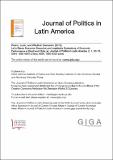| dc.contributor.author |
Lucio Renno and Wladimir Gramacho |
| dc.coverage.spatial |
Brazil |
| dc.date.accessioned |
2016-01-07T15:23:27Z |
| dc.date.available |
2016-01-07T15:23:27Z |
| dc.identifier.uri |
http://desa1.cejamericas.org:8080/handle/2015/964 |
| dc.description.abstract |
In this paper we bring together institutional, contextual, and behav- ioral perspectives in a comprehensive model that explores determinants of executive and legislative approval based on economic performance in Brazil and Chile. Our main question is, do voters attribute responsibility for the state of the economy to their representatives in the Legislative Branch as they ap- parently do to officeholders in the Executive Branch? We search for answers to this question with an eye on how active the distinct branches of govern- ment are in economic policy-making and voters’ levels of political sophistica- tion. Our main hypothesis is that less sophisticated voters will blame politi- cians indiscriminately for the state of the economy, independent of how influ- ential each branch of government is on economic policy. More sophisticated voters will better discern the role each branch plays in economic policy- making and will not blame representatives in the Legislative Branch for the state of the economy when Congress is not active in economic policy-making. The cases of Brazil and Chile under Cardoso and Lagos offer the perfect op- portunity to test this hypothesis, which is confirmed by our data. |
| dc.language.iso |
English |
| dc.title |
Let’s Blame Everyone: Executive and Legislative Evaluations of Economic Performance in Brazil and Ch |
| dc.ceja.source |
Fuente: Journal of Politics of Latin America |

